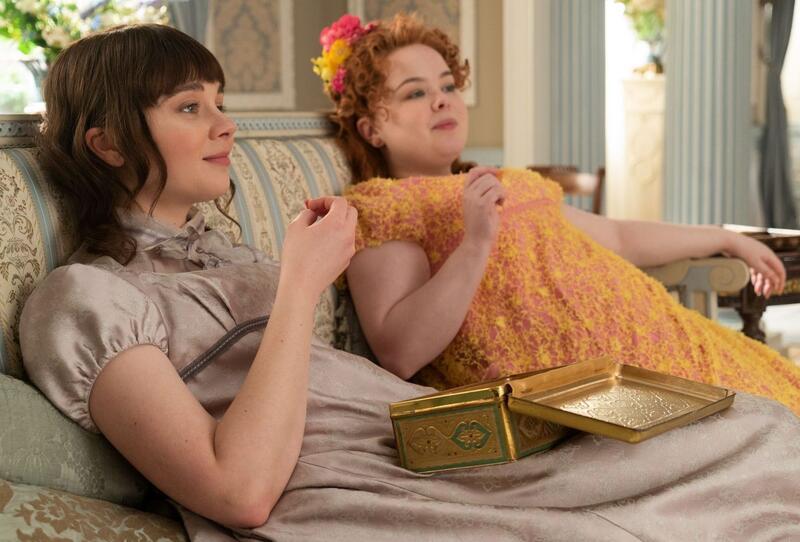'Bridgerton' is Frilly and Problematic, but We Want More
Spoilers ahead! Content warning for sexual assault.
I’ll watch basically any show that features pastel ball gowns, sprawling gardens, stolen glances, and vaguely historical backdrops. But this kind of period drama is a guilty pleasure for me. The genre challenges my feminist sensibilities: People of color are regularly excluded, and portrayals of women are often regressive. So when I heard about Bridgerton, Netflix’s new series directed by Shonda Rhimes and based on the romance novels by Julia Quinn, my hopes were high. Quinn’s status as a successful Jewish female author, and Rhimes’s as a prominent Black female director, only made me more eager to binge-watch. Before the show’s premiere, I devoured articles that lauded its diverse cast and feminist depictions of sex. When Quinn described her excitement about the show’s inclusivity and connected it to her Judaism in an interview, my anticipation only grew.
After I finally watched the show (within a 48-hour period, I’ll admit), I was relieved to find that in many respects, the show’s pre-release praise was deserved. Bridgerton breaks some barriers, especially regarding representation, multi-dimensional female characters, and increased transparency about sex. However, while it would be easy to celebrate Bridgerton as a sparkly remedy for the ills of the period drama genre, the reality is more complicated: Its depictions of race, feminism, and consent take some steps in the right direction, but are ultimately flawed.
Growing up with white privilege, I rarely focused on the fact that the characters in the period dramas I loved were predominantly white. Of course, almost none of these characters were ever Jewish either, but their whiteness meant that I could still see myself in female protagonists, and I felt represented enough in the genre. I rationalized the exclusion of both Jewish characters and characters of color as attempted “historical accuracy.” I didn’t come up with this theory on my own: This deeply flawed argument has been frequently cited by prominent directors of period dramas. For example, creator of the ultra-white Downton Abbey Julian Fellowes brushed aside calls for more inclusive casting by claiming, “You can’t make something untruthful.”
The irony is that Fellowes’s statement about untruthfulness is untruthful itself. There’s plenty of historical documentation regarding the lives of people of color in Britain and western Europe dating back to the medieval era, but directors still consistently fail to make representative movies and television. Enter Bridgerton. Shonda Rhimes’ diverse cast, with Black actors playing members of the British aristocracy alongside white co-stars, is undoubtedly a win for representation and inclusivity. Queen Charlotte, played by Black actress Golda Rosheuvel, is an especially thought-provoking casting decision: I learned only after watching the show that there’s evidence Queen Charlotte had Black ancestry in real life—exposing me to a fascinating new historical possibility. These choices force white viewers like me to grapple with our preconceived notions about European history. The importance of this representation in such a high-budget, high-profile period drama shouldn’t be minimized.
I wondered, however, if diverse casting allowed Bridgerton’s writers to sidestep the more uncomfortable nuances in addressing race and representation, and ultimately cater to white viewers. I’m referring to what other writers have termed a “colorblind” approach—a near-total silence on race throughout the show, save one conversation between Simon Basset (Regé-Jean Page), the Black male romantic lead, and Lady Danbury (Adjoa Andoh), an older Black socialite. In this exchange, Lady Danbury asserts that since (in Bridgerton’s alternate history) the king married a Black woman, this is proof that love can conquer all racial divides and tensions. Simon goes on to marry Daphne Bridgerton (Phoebe Dynevor), a white woman, and there’s not a peep from any of the white characters about race. This creates an illusion of complete normalcy—a fantastical (and convenient) absolution of white guilt. Because the white characters are silent on race, and the show itself largely overlooks it, white viewers are allowed to ignore the centuries of oppression and violence that people of color have endured at our hands. White characters and viewers alike can avoid the discomfort of accountability, or at the very least, being honest with ourselves about the complexities of race and racism.
Bridgerton’s imperfect progressivism doesn’t end here—its stances on feminism and sex are also somewhat mangled. It’s not a complete train wreck: Despite its setting in Regency Britain, in which women’s lives were dominated by pressure to marry, there’s a charmingly matriarchal feel to Bridgerton’s depiction of London society. This includes the Queen’s omnipotent presence and influence in the social scene, the compelling mother figures of Lady Danbury, Dowager Viscountess Bridgerton (Ruth Gemmell), and Baroness Featherington (Polly Walker), a wide array of young female protagonists, and the cultural power wielded by the mysterious Lady Whistledown. These women openly discuss their anxieties about searching for a husband, the forcefulness and ignorance of the men around them, and their desires to explore both romantic and intellectual opportunities. Maybe most importantly, they discuss, and have lots of, sex. This is in part because Bridgerton is based on a series of romance novels—a literary genre largely written by and consumed by women that often openly depicts sex through the female gaze. (Because women are never allowed to enjoy things, the romance genre has long been derided by male critics, but that’s a topic for another blog post).
But the steamy, flashy romps of Bridgerton’s beautiful aristocrats don’t negate the disturbing and problematic elements in the central romantic relationship between Daphne and Simon. There’s a lot to unpack with these two—notably, their skewed power dynamic, which becomes quickly evident as Daphne pressures Simon into marriage despite his clearly expressed objections. This dynamic, in which Daphne continues to take advantage of Simon without much repercussion, is a grotesque distortion of feminist ideals. In the show’s worst scene, Daphne forces Simon to climax inside her during sex, even as he repeatedly says “wait.” Even worse than the scene itself was my later realization that I hadn’t even initially understood Daphne’s violation of Simon as sexual assault. Simon, a man, doesn’t fit the typical image of an assault victim, and Daphne, a woman, doesn’t fit that of an assaulter. Bridgerton remorselessly perpetuates these harmful assumptions, and ultimately gives Daphne a pass for her behavior. I should note that Daphne’s comprehension of consent is likely skewed due to her complete lack of understanding about sex. It’s extremely troubling to watch, though, as she’s barely held accountable for her actions, and Simon’s traumatic experience is seemingly justified by his own flawed treatment of Daphne.
At the end of the day, will I watch Bridgerton season two? Probably. I’m already this far down the rabbit hole. But I’m hoping the show will begin to fully live up to its hype by reevaluating its portrayals of race, gender, and consent. In the meantime, I’ll keep dreaming about those pastel ball gowns.








Adding to your comments above, is Bridgerton not also making fun of this genre of TV period drama- a fast paced amusing pastiche?